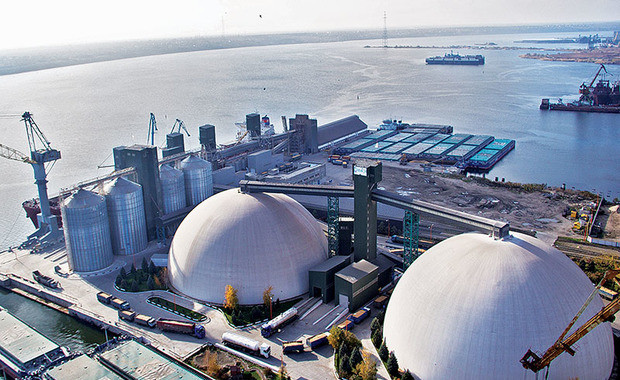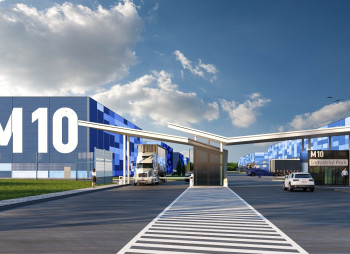One such entity is the Fozzy Group, the biggest retail chain in Ukraine with 522 supermarkets at the start of 2016. It recorded Hr 46.5 billion ($1.9 billion) in annual turnover last year.
Its founder, Volodymyr Kostelman, earned his first capital in the turbulent early 1990s by selling imported tea, coffee and chocolate. In 1997, he opened his first Fozzy Cash & Carry supermarket in Kyiv, which developed into today’s vast retail chain with its own production centers and import business. The company ended 2015 with a Hr 297 million ($11.8 million) net profit, compared to a profit of Hr 847,000 ($33,000) a year before.
Ukraine’s rich soils have meant that agriculture remains a strong, though underdeveloped part of the economy. Several big agricultural companies have emerged since 1991.
Nibulon, for instance, is Ukraine’s leading grain trader, based in southern Mykolaiv Oblast. In the 2015/2016 marketing year. the company exported 4.66 million tons of grain, or 12 percent of Ukraine’s total grain exports.
The company traces its history back to Ukrainian independence, when it was co-founded by Oleksiy Vadaturskiy, along with two firms from Hungary and Britiain, in 1991.
Nibulon succeeded because it had the will to do so, 69-year-old Vadaturskiy, who remains the company’s CEO.
Nibulon’s chief complaint is that the government has not done anything to create favorable investment conditions. The authorities are preoccupied with International Monetary Fund loans or staving off default, while businesses are left alone to solve their problems, such as a lack of access to credit.
“Today, only business and Ukraine itself can solve this problem,” Vadaturskiy said. “The state should pay attention to business, help it solve the immediate issues so it can really invest in the Ukrainian economy.”
Another big agricultural company is Mironivsky Hliboproduct (MHP), Ukraine’s leading poultry producer. The company’s profit was $366 million in 2015. MHP operates a complete production cycle, from incubating eggs, rearing chicks, slaughtering mature birds and processing.
It was founded in 1998 by Yuriy Kosyuk, the fifth richest person in the country, according to Forbes magazine. Kosyuk entered big business as a grain trader, but decided to switch to poultry after visiting some chicken meat factories in the United States, Brazil and Europe in 1999.
“I understood that Ukraine didn’t have to import poultry, it should export it,” Kosyuk said in an interview with Forbes. “We have all of the ingredients for competitive production: fodder, energy, and a cheap labor force.”
Such home-grown ingredients also went into the success of Obolon, Ukraine’s largest domestic brewer. While it has been a success, it ended last year recorded a $13 million loss. Experts link the company’s poor financial results to a drop in consumer buying power and higher excise taxes.
The Kyiv-based plant started production on the eve of the Moscow Summer Olympics in 1980 to satisfy the demand for a European-quality beer. After Ukraine gained independence, Obolon’s ability to experiment helped it stay on the market.
One of Obolon’s most successful ideas came from the brewery’s former general director and current president, Oleksandr Slobodyan, while on a plane in 1993. As he sat mixing a gin and tonic, he had an idea: why not produce pre-mixed bottled drinks? The resulting Rum and Cola, Gin and Tonic and Brandy and Cola products have been on the shelves of Ukraine’s stores ever since.
But it’s not just domestic food and drinks firms that have managed to do well in independent Ukraine: a subsidiary of Swiss giant Nestlé was among the first foreign companies to bring products with exotic names like NESCAFÉ, Nesquik, Maggi, and Nuts to Ukrainian supermarket shelves. Nestlé started operations in Ukraine in December 1994, and after only two years it became one of the most profitable branches of the Nestlé family worldwide.
Now Nestlé Ukraine produces fast moving consumer goods like sauces, coffee, drinks, sweets and instant foods. In such a competitive market, it is critical to adapt to changes in consumer demand and purchasing power, says Ansgar Bornemann of Nestlé Ukraine and Moldova. “This is especially true if we look at the last two to three years, during which we’ve seen tremendous economic turbulence and price increases due to the devaluation of the hryvnia,” Bornemann.
Another way for companies like Nestlé to succeed is to support suppliers and retailers, Bornemann said. It is critical “to develop and provide them with tools and support on how to market our products in a way that grows their own business.”
Bornemann said Darwin’s theory of evolution is also true for business – it’s not the biggest or strongest that always wins, but the ones most able to adapt to change.
And change comes no faster than in the technology business, the cellular phone business in particular. Kyivstar, the largest homegrown mobile operator with 25.4 million clients in Ukraine, has adapted well.
The company’s history started in 1994, a year after the mobile telecommunications officially arrived in Ukraine. The first call in the Kyivstar mobile network was made in 1997.
“I think the macroeconomic situation, despite its overall importance, was not the key factor in Kyivstar’s becoming the leader on the market,” Petro Chernyshov, the president of Kyivstar. Rather, he said, Kyivstar “loves its clients.” The company processes 46,000 calls per day to its customer helpline. Over 4,000 employees work to provide clients with reliable connections, access to new technologies and knowledge of company products, Chernyshov said.
Lastly, every Ukrainian will have used the products of flexible packaging producer, UKRPLASTIC. In the early 1990s, the enterprise was on the verge of bankruptcy, but it has since managed to develop into one of the top 30 global manufacturers of flexible packaging.
True, the current economic crisis in the country has damaged the company’s finances. UKRPLASTIC suffered a net loss of almost a half a billion hryvnias in 2014. But in 2015, UKRPLASTIC managed to halve its loss to Hr 261 million ($10.4 million) compared to the previous year.
The enterprise has set up full cycle production of high-tech, environmentally friendly packaging for the food, pharmaceuticals, and cosmetic industries.
UKRPLASTIC works where printing, chemistry and the food industry overlap. Much of its success is a result of introducing cutting-edge achievements in all of those spheres, as well as developing close relationships with suppliers, according to Irina Mirochnik, the president of UKRPLASTIC.
“I consider our position in the environmental sphere as undoubtedly one of our greatest achievements,” Mirochnik told. “25 years ago we were the first to abandon the manufacturing of products that are harmful to people, and we have consistently introduced higher environmental standards at all levels of our business.”
InVenture Investment Group is an experienced partner with a proven track record in the Ukrainian Private Equity and Venture Capital market will help you to find appropriate investment opportunities, start and expand your business in Ukraine.
Source: Kyiv Post





.jpg)
